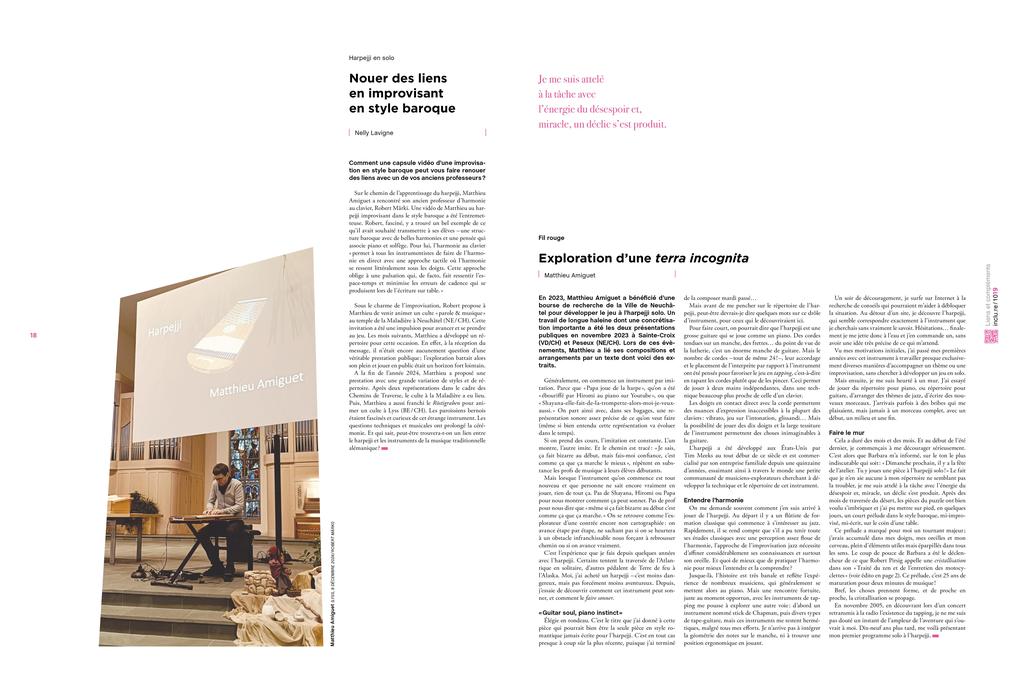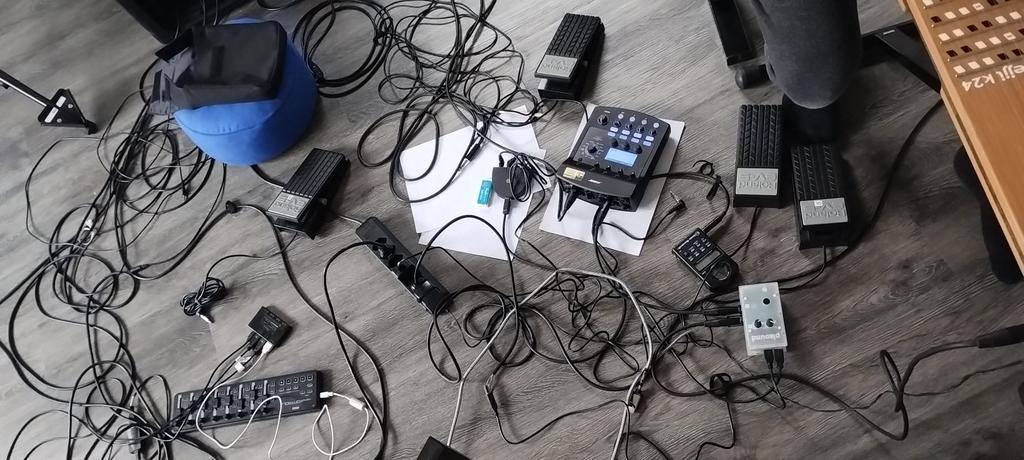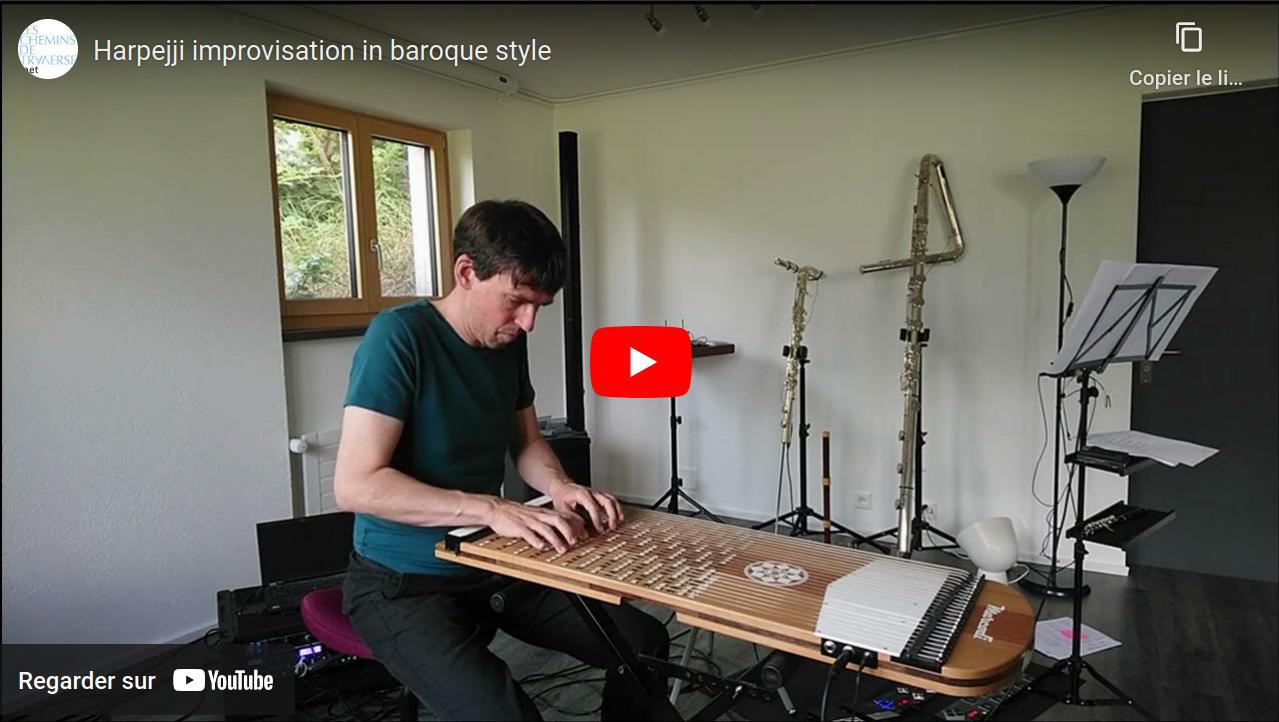Harpejji solo
Développement d'un langage
L'harpejji est un instrument électro-acoustique à mi-chemin entre la guitare et le clavier. Inventé en 2007 et commercialisé depuis 2008, c'est donc un instrument très nouveau pour lequel tout est à inventer: pas de méthode, de technique "officielle", de répertoire ou de représentation sonore sur lesquelles s'appuyer.
Depuis 2014, un des axes de recherche de Matthieu Amiguet a été de développer des techniques d'accompagnement à l'harpejji. Ce travail a pu se concrétiser non seulement sous forme de concerts, animations et vidéos, mais également sous la forme d'articles pédagogiques sur son blog et contributions à des forums, afin que sa recherche soit utile plus largement à la communauté des harpejjistes. Les articles et vidéos jouissent d'une visibilité internationale et ont attiré l'attention de personnes telles que Tim Meeks, inventeur de l'harpejji, ou Paul Mirkovich, directeur musical de The Voice US.
Après les techniques d'accompagnement, Matthieu Amiguet désire maintenant prolonger ce travail par une recherche sur les techniques de jeu solo. Hybride entre la guitare et le clavier, l'harpejji peut emprunter des éléments de technique à ces deux instruments, mais rien n'est directement transposable. Il y a donc tout un travail pour identifier le répertoire se prêtant à une transposition (pour les pièces écrites) et développer un "vocabulaire" adéquat pour l'improvisation.
Au printemps 2023, il a obtenu une bourse de recherche de la Ville de Neuchâtel pour l'accompagner un bout dans cette démarche de longue haleine.
Ce n'est donc pas à proprement parler un projet des Chemins de Traverse, mais, dans le plus pur esprit de la Scène de création continue des Chemins de Traverse, il a été décidé d'ouvrir ici une tribune pour documenter ses recherches, .
NB Pour permettre à la communauté internationale de l'harpejji de bénéficier au mieux de ces informations, les actualités de ce projet seront rédigées en anglais.
Sur scène
Chemin de création
Harpejji - Le Rapport #10

Une page de notre Scène de Création Continue est consacrée au Harpejji solo. Vous y trouverez le chemin parcouru par Matthieu Amiguet avec ce nouvel instrument sans loi ni maître.
Il est possible de voir une série de cours extraits filmés lors du Salon Exploration d'une Terra incognita.
La vidéo du Prélude, déclancheur de la collaboration entre Robert Märki et Matthieu Amiguet:
Reflets en vidéo du salon "Harpejji"
Le 23 novembre, Matthieu Amiguet a proposé à l'Atelier des Carrels un Salon autour de son travail à l'harpejji solo. Voici quelques reflets en vidéo de ce moment, qui mettent en évidence la diversité des style et des sonorités que l'on peut obtenir avec cet instrument.
NB L'harpejji descendant assez bas dans les graves, nous vous conseillons d'écouter ces extraits avec un casque ou des hauts-parleurs de qualité!
D'abord, une Introduction sous forme d'une improvisation modale:
Ensuite un extrait d'une Élégie en rondeau, pièce dans un style romantique écrite par Matthieu Amiguet:
Puis une improvisation inspirée par la musique du Moyen-orient:
On continue avec un prélude dans le style baroque écrit par Matthieu Amiguet
Un arrangement du standard de jazz My Funny Valentine:
Puis une improvisation "comme un orgue" avec des pédales de sustain faites maison:
Une improvisation sur des gammes par tons entiers tirée d'une composition intitulée Sandwich aux tons:
Et pour finir deux extraits d'une pièce de jazz modal composée par Matthieu Amiguet et intitulée Waiting for the light.
Parole & Musique avec harpejji
Chapelle de la Maladière
21e Salon: Harpejji - explorations d'une terra incognita
Atelier des Carrels
WIP à la Datcha #2 - Harpejji - explorations d'une terra incognita
La Datcha
Atelier vivant

Il est des jours où l'atelier reflète d'une certaine ardeur au travail.
Improvisation sur un poème de Rûmî
Beau moment de musique partagée au plateau de lecture dimanche dernier: venu avec un poème de Rûmî, Ahmad Motalaei a désiré le chanter plutôt que de le lire. Matthieu Amiguet a alors proposé de l'accompagner à l'harpejji. 10 minutes d'improvisation totalement non préparée, mais avec une qualité d'écoute de part et d'autre qui en a fait un petit moment de grâce que nous désirons partager avec vous.
Harpejji baroque improvisation
As a follow-up to the Harpejji solo project, Matthieu Amiguet published a video of an improvisation in baroque style on the harpejji.
The video is available on Matthieu's website.
Harpejji solo 17 - Conclusion
(This news is part of the Harpejji solo project)
I'm reaching the end of this Harpejji solo project. Of course, this does not mean (at all!) that I'm going to give up practicing and playing solo harpejji, but the part of my research that is supported by a grant of the Ville de Neuchâtel is getting to an end.
So what are the takeaways of these few months with a focus on playing the harpejji solo?
I discovered a number of sheet music that are nice to sightread on this instrument. I practiced some pieces, from both classical and jazz repertoire. I also acquired vocabulary for improvising on the harpejji.
But mostly, I think I clarified where I want to go from now. Basically, the idea will be: develop more and more vocabulary and grammar to be able to play in a jazzy style. Do the same with classical music from the common practice period. But these will be only tools. The next and most important step will be to mix all this in a more personal style (that might admittedly be difficult to classify), in the spirit of what I'm already doing with my flutes (see for instance the Dragonfly project or my passamezzo video).
This will definitely be a journey of several years, but I'm expecting to find the way in itself interesting enough that it doesn't seem long. I will probably encounter difficulties and experience some discouragement from time to time, but having a map that shows the general direction in which I should be moving will certainly help.
So... stay tuned, and hopefully I will be able to produce harpejji music...

